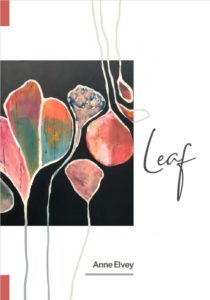Jennifer Compton reviews “Leaf” by Anne Elvey
By Anne Elvey
ISBN 9780645044966
Reviewed by JENNIFER COMPTON
Anne Elvey was recently shortlisted for the David Harold Tribe Poetry Award for one of her elegant, prayerful compositions, that hardly seem to be composed of words as we know them, and yet I suppose they must be. They lift up off of the page, they seem to linger in the air.
Don’t get me wrong, I was very taken with all of the shortlisted poets, as I hunkered down on Zoom, and any one of them could have won and I would not have been disgruntled.
But I was so taken with the flavour and intent of Elvey’s work, all over again, that I returned to re-read and reconsider her 2022 collection Leaf. This is a handsome book issued by Liquid Amber Press, the brainchild of Pauline Brightling and Rose Lucas, whom I can only suppose had a rush of blood and decided to test their relationship and work very hard, whilst ripping up $10 notes, bedazzled by something ineffable.
So, I am coming at this book for the second time. And this time through I pause to dwell on the epigraph from John Charles Ryan’s book Plants in Contemporary Poetry. Because, after all, a poet would not go to all the trouble of choosing a suitable epigraph, and seeking permission etc, unless they trusted their choice would illuminate the thrust of the book and guide the reader.
‘How do we imagine plants? How might plants imagine us?’
Indeed, it may even have been the spark that lit the tinder that set the fire of imagination roaring. Because immediately, in ‘Part 1 To listen for the leaf’, in the first poem ‘Leaf’, Elvey sets about the task of addressing, if not answering, these questions.
you touch from inside’s
other vein and skin
silver
to a spot of rust smooth
to the swell of an insect’s
egg held in fingers
breath
becomes a word
(p3)
The necessity of breath, which the leaf understands, as it converts light into sustenance into oxygen, again and again and again, is acknowledged and honoured. An ancient pact, a symbiosis, almost, indeed, a cabal. And there is a kind of psychometry in this first section, as if hands can hear, as if hands had another sort of ears that listen for and to the unsayable, that can know, ‘beyond the break and repair of language’ what is not unknowable.
Ask what
answer your hands should
give. It is time. It is time
they listened for the leaf.
(p12)
And so, the preamble done and dusted, Elvey sets to work in “Part 2 The dark industry of life” amplifying the musicality of the daily round. In “Artefact” the wooden table contains hidden messages. It’s just a matter of knowing where to stand in the angle of the light to decipher them. And in ‘Taking leave of no. 5” the trees are condemned, the landlord is adamant. But do you listen when they tell you not to look back? No, you don’t. Not when you are imbued with a reckless generosity and also like to keep a sanguine eye on circumstance. The times. How do they do? Do they do well? Do they do ill? And how does the weather, the soil, and every other constituent of the macrocosm? Take your lesson from the tree. Take advantage.
A tree takes
gives. Prudence
means nothing
to a tree.
(p22)
The book swirls on through ‘Part 3 Luring water’ and ‘Part 4 These knuckles’ welt on wood’ and ‘Part 5 Not to spoil the well’ with a limpid and supple assurance, ‘like a liquid handling a thing.’ Or, like a walking meditation, which is the next best thing to prayer. As if prayer is doubting and hoping in equal part whilst moving mindfully. In ‘Leaf and tumble’, which I find to be the apotheosis of this book, and which I happen to know was the poet’s preferred title, comfort is sought, out in the natural world, within its blithe imperatives and its deep and deepening mysteries.
Did I imagine the whispered
intent, the certainty of my ground
as way to go, the tether
of limb to trunk, until I could
no longer suppose you were
or are? My feet unrooted
from earth, what answer comes
to my tentative cry? Without
a word wind lifts
again. Leaf tumbles.
(p45)
Elvey’s craft is gentle and! astute. She untethers her mode of enquiry from antique certainties and shibboleths to, as it were, begin again. To see afresh what can be seen and to understand, feelingly, what can be understood. To ask questions that, as of yet, cannot be answered.
From ‘Under the rotary clothesline’
Reaching for a peg
I wonder how might
I have looked
to another
(p67)
JENNIFER COMPTON is a poet and playwright who also writes prose. She lives in Melbourne on unceded Boon Wurrung Country. Recent Work Press published her 11th book of poetry the moment, taken in 2021.
